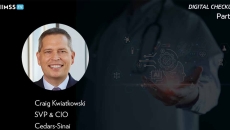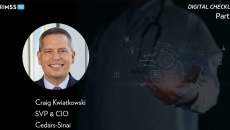clinical AI
HIMSS24
Dr. Colin Banas, CMO at DrFirst, discusses the company's medication adherence product. It uses AI to send texts that educate patients about medications and provides coupons and co-pay-assistance program information, if cost is an issue.
HIMSS24
Alex Diaconu, CEO of AiGIA Health, shares the story of how his chronic illness inspired him to start the company to help patients improve their health by practicing preventative care.
Mayo Clinic vice chair of AI and innovation Dr. Alexander Ryu discusses building frameworks for AI fairly and equitably through collaboration - and how the organization decides to partner with companies with already established models.
In part two of a two-part series, Dr. Bruce Darrow, CMIO and interim CDIO at Mount Sinai Health System, discusses how the health system utilizes AI for predictive care, reading diagnostic images, and streamlining administrative operations.
In part one of a two-part series, Dr. Bruce Darrow, Mount Sinai Health System CMIO and interim CDIO, relays how patients may gain confidence in relying on AI instead of doctors as accuracy of pattern recognition and predictive models improve.
HIMSS24
Dr. Calum Yacoubian, director of NLP healthcare strategy at IQVIA, says AI can support, not replace, clinicians in improving care delivery, and discusses some best practices for its safe and ethical use.
The HIMSS AI in Healthcare Forum is scheduled to take place September 5-6 in Boston. Learn more and register.
HIMSS24
Ziv Ofek, cofounder and CEO of MDClone, discusses how GenAI tools may soon make it easier for clinicians to analyze synthetic data themselves if guardrails are in place to ensure that the AI's conclusions are correct.
HIMSS24
Dr. Michal Tzuchman Katz, cofounder and CEO of Kahun, discusses how educating doctors on the source of information for the company's clinical knowledge graph and how the product supports patient care encourage its adoption.
CIO Craig Kwiatkowski offers a look at the AI tools deployed at the famous health system and discusses the measure of success of AI initiatives, as well as how the technology can help identify disparities in care access and outcomes.
Cedars-Sinai CIO Craig Kwiatkowski discusses using the FAVES approach (fair, appropriate, valid, effective and safe) in genAI adoption, as well as the "build vs buy" question, and challenges with integrating AI technologies into existing systems.









